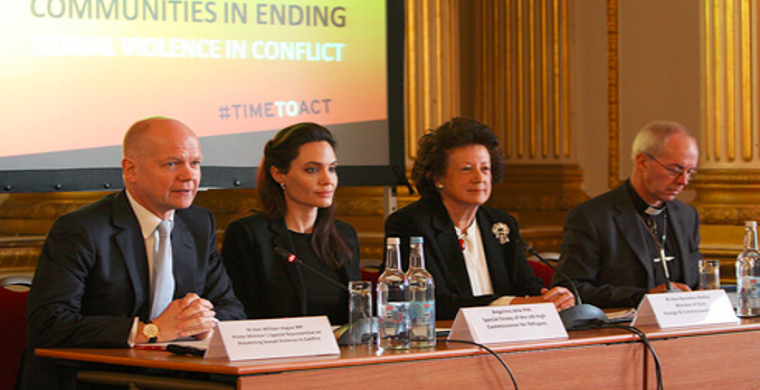Anglicans speak out on sexual and gender-based violence
Anglican Alliance
February 16, 2015
Anglicans gathered with other faith leaders in London to set recommendations for how faith communities can work collaboratively, together with governments and national and international stakeholders, to end sexual violence in conflict. The two day interfaith consultation was convened by the We Will Speak Out coalition and UK Foreign & Commonwealth Office (further coverage of the meeting here).
The Anglicans taking part in the meeting were: Mathilde Nkwirikiye (Anglican Church of Burundi), Archbishop Henri Isingoma (Anglican Church of Congo), the Rev. Joseph Bilal (Episcopal Church of South Sudan and Sudan), Vijula Arulanantham (Church of Ceylon), Archbishop Francisco de Assis da Silva (Igreja Episcopal Anglicana do Brasil), Bishop Margaret Vertue (Anglican Church of Southern Africa), Bishop Ellinah Ntfombi Wamukoya (Anglican Church of Southern Africa), Bishop Christopher Cocksworth (Church of England) and the Rev. Rose Hudson-Wilkin (Church of England).
On the final day of meetings faith leaders made a joint statement (the full text is available below). You can add your voice to theirs at http://www.wewillspeakout.org/interfaithevent2015.
On Feb. 11, the Anglican Alliance hosted a webinar on how churches can mobilize to end sexual and gender-based violence in their communities and raise their voices with other churches and faith communities globally to tackle these issues at a global level.
Speakers addressed subjects such as care and support of survivors of gender-based violence; ensuring survivors are at the heart of church responses; gender justice and theology; engaging men and boys in ending gender-based violence; faith leaders speaking out; and church as a "safe space" for survivors.
The webinar was chaired by the Rev. Rachel Carnegie, co-executive director of the Anglican Alliance, and presenters included: Archbishop Henri Isingoma, Anglican Church of Congo (DRC); Mathilde Nkwirikiye, Mothers' Union in Burundi; Mara Luz, Episcopal Church in Brazil; Therese Mama Mapenzi, a partner of CAFOD in DRC; the Rev. Terrie Robinson, director for women in church and society at the Anglican Communion Office; and Paulo Ueti, theologian and Anglican Alliance facilitator for Latin America and the Caribbean.
You can listen to the recording of the webinar and access the slides, with presentations in both English and French.
Resources relating to many of the themes discussed on the webinar are available at: http://www.wewillspeakout.org/resources.
Inter Faith Declaration on Mobilising Faith Communities to End Sexual Violence in Conflict, 9-10 February 2015
We have come together at the inter faith consultation on 'Mobilising Faith Communities to End Sexual Violence in Conflict', 9-10 February 2015, because we recognise our particular role and responsibility as leaders in helping bring to an end the use of rape and other forms of sexual and gender based violence in conflict. This consultation advances the discussion at the 'Global Summit to End Sexual Violence in Conflict' held in London in June 2014.
As faith leaders, we acknowledge that all faiths affirm the dignity of human beings and so condemn sexual violence. We share a common understanding of our potential to mobilise people at all levels to work together to end sexual violence in conflict. We will challenge the culture of impunity that exists for these crimes, and use our influence to mobilise and encourage leadership and commitment across governments, communities and religious institutions to protect human rights and provide safe spaces and support to survivors and their families.
We will promote the dignity and rights of survivors of sexual violence, both female and male. The shame for these crimes lies with the perpetrators and not those who suffer them. We have a critical role to play in tackling the root causes of sexual violence, including the subordinate and unequal status of women around the world, and harmful cultural, religious and social norms, including distorted notions of masculine identities. Ideas of culture or tradition, or misapplication of sacred texts, must never be used to allow impunity for perpetrators of sexual violence. We will also seek to work with perpetrators to end the cycle of violence.
Based on our discussions, we have determined the distinctive role of faith leaders in:
Defending values of faith and human rights
Tackling impunity and promoting justice and accountability
Supporting survivors of sexual violence
Engaging men and boys in promoting positive masculinities and transformed gender relations
Peace building and peace processes
We have agreed to implement recommendations for collaborative action in these areas, as set out in the Report of the Inter Faith Consultation on Mobilising Faith Communities to End Sexual Violence in Conflict. As faith leaders, we commit ourselves to take these actions:
We will speak out against sexual and gender-based violence in conflict at every opportunity
We will take action together to promote human rights and see girls, women, boys and men freed from the threat and impact of sexual violence in conflict across the world.
We will stand together in solidarity with all those affected by sexual violence.
We will promote the development and implementation of laws that protect and promote justice to bring an end to sexual, and other forms of gender based violence during and after conflict, holding governments to account.
We will strive to build peace and promote reconciliation, challenging the internal and external causes of conflict.
We will dedicate ourselves to finding lasting solutions; mobilising leadership at all levels and implementing these values within our own faith community.
We call on all faith leaders to join us in speaking out and to work together with governments, national and international stakeholders, and communities to help end the use of sexual violence in conflict.
END














